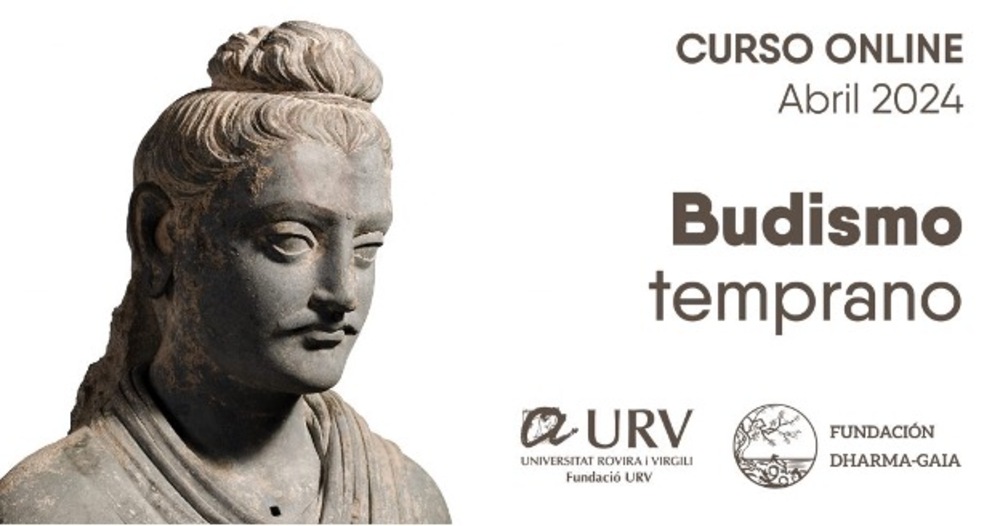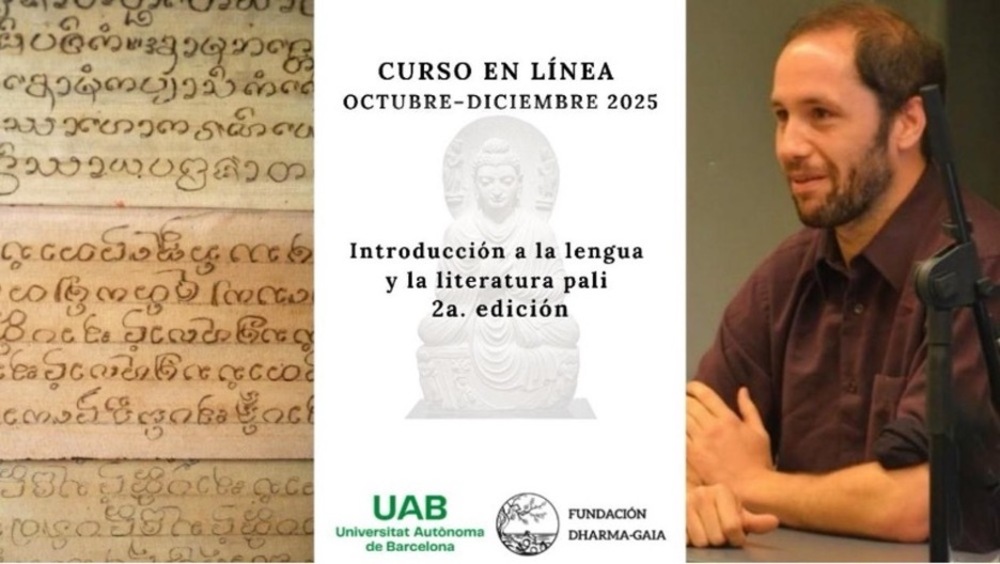Leading the Academic Teaching of Buddhism in Spanish
The Dharma-Gaia Foundation (FDG) has established itself as a reference in the academic teaching of Buddhism in the Spanish-speaking world. Through strong strategic alliances with leading academic institutions, it offers rigorous and accessible training. Their commitment goes beyond mere instruction, focusing on building a collaborative network that promotes the study of Buddhism as a discipline throughout the region.
Strategic alliance with the Fundació Universitat Rovira i Virgili
Since 2021, the Dharma-Gaia Foundation And the Rovira i Virgili University Foundation (FURV) have forged a strategic alliance that has established itself as a benchmark in the promotion and development of Buddhist studies in Spanish. This fruitful collaboration has promoted research and academic training, the organization of conferences and seminars, and the publication of important academic works, such as the two volumes of Buddhist studies in Latin America and Spain.
This synergy between the FDG and the FURV has not only facilitated access to high-quality Buddhist training in Spanish, but it has also established a precedent for inter-institutional collaboration in the academic field. By combining the experience of the FDG in teaching Buddhism with the infrastructure and rigor of the FURV, a unique space has been created for critical reflection and in-depth study of Buddhist traditions, contributing to their legitimation and expansion in the Spanish-American university context.
As a result of this joint work, two training cycles have already been taught, each consisting of four modules over two years, totaling a total of 8 courses. Each of these programs has lasted 60 hours and provides 6 academic credits, constantly attracting between 60 and 80 students per course, who praised the quality of the content and the high level of the teaching staff.
The collaboration with Buddhistdoor in Spanish and the FDG's promotional efforts have been essential for the wide dissemination of these courses and for facilitating the participation of leading specialists. On the other hand, since both the FURV and the FDG are non-profit entities, the FDG can bear the organizational and promotional costs, which translate into affordable tuition for students.
This alliance not only celebrates the achievements achieved, but also lays the solid foundations for future initiatives, including new publications in progress and the expansion of academic offerings.
Next cycle of four quarterly FDG-FURV courses (2026-2027)
The collaboration between FDG and FURV is consolidated with a new course cycle for the period 2026 and 2027, marking the third edition of their academic programs.
1. Early Buddhism and the Theravāda Tradition: Teachings and Practices
Dates: April — June 2026
Teachers: Agustí Pàniker Vilaplana, Aleix Ruiz Falques, Bhikkhunī Arindama

2. Mahāyāna Buddhism and its expansion into East Asia
Dates: October — December 2026
Teachers: Agustí Pàniker Vilaplana, Dr. María Elvira Ríos Peñafiel (UPC), Dr. Gustavo Pita Céspedes (UAB)
3. Vajrayana and Tibetan Buddhism: Teachings and Practices
Dates: April — June 2027
4. Modern and Contemporary Buddhism
Dates: October — December 2027
Academic collaboration with the Autonomous University of Barcelona (UAB)
FDG also maintains a framework agreement and a fruitful collaboration with the Autonomous University of Barcelona (UAB), and the UAB has positively evaluated the classical languages of Buddhism program. This alliance has allowed rapid progress in offering courses in Pali, Sanskrit and Classical Tibetan, essential for the in-depth study of Buddhist sources. In addition, new courses compatible with those of the FURV are being developed, such as a new course in Buddhist art, and future joint publications are planned.
Classical Buddhist language courses offered by FDG and UAB to date
1. Introduction to Pali Language and Literature (1st Edition) (Pali I)
Dates: October 2 — December 18, 2024
Teacher: Dr. Aleix Ruiz Falques
2. Introduction to Pali language and literature. Advanced Concepts (1st Edition) (Pali II)
Dates: April 2 — June 25, 2025
Teacher: Dr. Aleix Ruiz Falques
3. Introduction to Pali language and literature (2nd UAB edition) (Pali I)
Dates: September 29 — December 22, 2025
Teacher: Dr. Aleix Ruiz Falques

4. Introduction to the Tibetan Language: Reading Tibetan Buddhist Texts (1st Edition)
Dates: September 29 — December 22, 2025
Teacher: Ferrán Mestanza Garcia
5. The offer of classical languages will expand in 2026 with the following courses:
Sanskrit I: April — June 2026
Sanskrit II: October — December 2026
Poles III: January — June 2026
Poles IV: July — December 2026
Tibetan I (to be determined):
Tibetan II (to be determined):
6. Buddhist art course:September — December 2026
Other collaborations and projects
The strengthening of this educational project has been achieved thanks to a robust network of collaborations with universities and other entities, a constantly growing alliance that enriches the founding mission of the FDG. A fundamental pillar of this framework is collaboration with the Ibero-American Network for the Study of Buddhism (RIEB), an institution of which he is one of the founding members, cooperating closely in the promotion of studies, conferences, conferences and publications.
It also highlights its collaboration with the significant ecological and educational initiatives of EcoBuddhism Laboratory (LEB), and the synergy established with the Catalan Coordinator of Buddhist Entitats (CCEB). With the latter, he co-organizes the prestigiousCatalan Buddhist Film Festival (FCBC) and develops other relevant initiatives.
In short, the Dharma-Gaia Foundation, through its strategic agreements with the Fundació Universitat Rovira i Virgili and the Autonomous University of Barcelona, together with other valuable alliances, is establishing a benchmark in the academic teaching of Buddhism in Spanish. This training offer is distinguished by its high quality and rigor, contributing significantly to the enrichment of the educational and cultural landscape.
Links:
”The situation of Buddhist studies in Spain: educational programs” by Juan Arnau Navarro, Montse Castellà Olivé, Francisco Díez de Velasco, Ricardo Guerrero Diáñez, Basili Llorca Martínez, Daniel Millet, Agustín Pániker Vilaplana, Aleix Ruiz Falqués, Jaume Vallverdú Vallverdú, Abraham Vélez de Cea.










